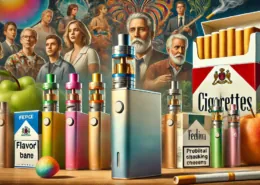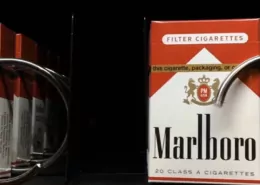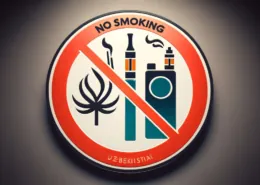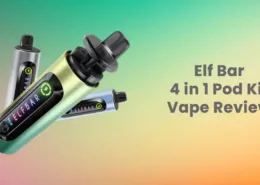Fruit-Flavoured Vapes Could Be Banned in UK Amid Child Vaping Epidemic
Disposable e-cigarettes flavoured like sweets and fruits could be banned under plans to crack down on Britain’s child vaping epidemic. The move could target nicotine-filled devices such as Elf Bars — which are hugely popular among teenagers. Neil O’Brien, the minister for public health, will reportedly begin to ask for evidence to justify the clampdown on such vapes in the next few days.
In recent years, vaping has exploded in Britain with every high street in the country now having a designated vape shop with e-cigarettes also sold for as little as £5 in almost all newsagents. The growing popularity of vapes among teenagers has prompted concerns over the potential for addiction and long-term health effects.
In this article, we will explore the potential ban on fruit and candy-flavoured vapes and examine the impact that these products have on children and young people.
Why Are Fruit and Candy-Flavoured Vapes Being Targeted?
The marketing of fruit and candy-flavoured vapes has been linked to alcopops, alcoholic drinks sold in bright neon-colours which are ultra sweet or fruit flavoured. Flavours such as strawberry ice cream, cotton candy, and cherry cola are some Elf Bar flavours currently available. Other brands also produce flavours such as cherry berry, vanilla custard, and raspberry slush. Such flavours are particularly appealing to children and young people, making them more likely to experiment with vaping.
The Government will examine the ‘appearance and characteristics’ of vaping products currently on sale, including looking at the marketing and branding, as well as the flavours available. Some brands can also feature cartoon characters as part of their tactics to appeal to customers.
Following the upcoming review, the flavours may be removed from the shelves. The Government will launch a consultation to ask experts how best to protect children from highly addictive nicotine.
What Are the Concerns Over Vaping Among Young People?
The use of disposable vaping products ‘increased substantially’ with 52.8 per cent of young vapers using them in 2022, compared to 7.8 per cent in 2021 and 5.3 per cent in 2020. Girls appear to be driving the trend, with the vape rate doubling among them in the last three years, while it has remained flat among boys for five years. The rate rises sharply among older pupils. Among 15-year-olds, one in five girls and one in seven boys vape, compared to one in 100 boys and girls aged 11.
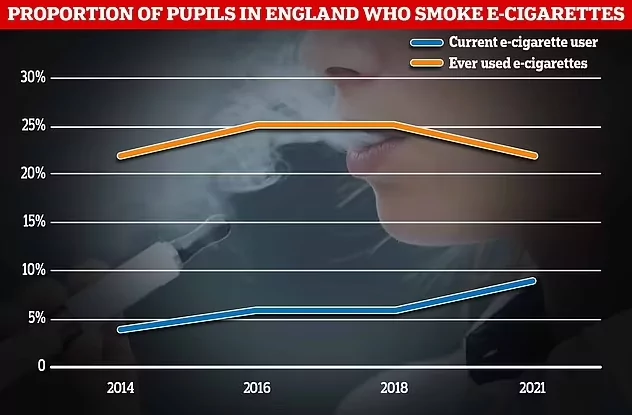
Around three-quarters of current vapers are also regular or occasional smokers. Only 3 per cent have never smoked. Friends (45 per cent), newsagents (41 per cent), and relatives (35 per cent) are the most likely sources of e-cigarettes for young vapers. Reports have shown that devices installed in schools to detect whether children are vaping are being set off up to 22 times a day.
What Are the Potential Health Risks of Vaping?
Health officials believe e-cigarettes can play a key role in weaning the remaining 5 million smokers in Britain off tobacco and get them to kick the killer habit. But, despite health chiefs insisting it is safer than smoking, it is not risk-free. E-cigarettes still contain harmful toxins, according to a study by researchers at the Medical University of Silesia in Poland. And their long-term effect on health remains a mystery with some doctors fearing a wave of lung disease and even cancer in the coming decades. Experts are also concerned the high nicotine content might increase blood pressure and cause other heart problems.
What Action Is Being Taken to Address the Issue?
The UK Vaping Industry Association (UKVIA) has demanded £10,000 fines be issued to any retailers caught selling e-cigarettes to kids. Despite it being illegal to sell vapes to under-18s, ‘unscrupulous retailers’ continue to flout the rules. The body, which represents brands like Juul and Geek Bar, also called for mandatory registration for all vape retailers and regular purchase testing to see whether they are age-checking under-18s in a bid to better police the issue.
In theory, this would make retailers subject to stringent qualifiers to join the compulsory fee-paying registration scheme and have to undertake education programmes for selling vapes. If not followed, this would give Trading Standards the ability to rescind registration for repeat offenders, removing their ability to sell vaping products.
Some parts of the vaping industry are also calling for greater action on those who sell the devices to children. This year, Waitrose became the first major supermarket to stop selling disposable vapes over worries about youngsters using them, along with concerns about the environment. And earlier this month, Morrisons, Tesco, Sainsbury’s and Asda removed at least some Elf Bars from sale after a Mail investigation found certain products contained illegal levels of nicotine.
Conclusion
While the use of e-cigarettes can be helpful for adult smokers to quit smoking cigarettes, it is important to consider the potential health risks and the impact it has on children and young people. The use of fruit and candy-flavoured vapes, in particular, has led to concerns over addiction and long-term health effects.
The upcoming review by the UK government will examine the appearance and characteristics of vaping products currently on sale, including the marketing and branding, as well as the flavours available. This review will help determine the best approach to protect children from highly addictive nicotine.
FAQs
What are fruit and candy-flavoured vapes?
Fruit and candy-flavoured vapes are e-cigarettes that are flavoured to taste like sweets and fruits.
Why are fruit and candy-flavoured vapes being targeted?
The marketing of fruit and candy-flavoured vapes has been linked to alcopops, which are particularly appealing to children and young people, making them more likely to experiment with vaping.
What are the potential health risks of vaping?
While health officials believe that e-cigarettes can help smokers quit smoking cigarettes, it is not risk-free. E-cigarettes still contain harmful toxins, and their long-term effect on health remains a mystery.
What action is being taken to address the issue of underage vaping?
The UK government is planning to review the appearance and characteristics of vaping products currently on sale, and the UKVIA has called for fines to be issued to retailers caught selling e-cigarettes to kids.
Can e-cigarettes help smokers quit smoking cigarettes?
Health officials believe that e-cigarettes can play a key role in weaning the remaining 5 million smokers in Britain off tobacco and getting them to kick the habit.
- North Carolina’s Vape Product Ban Takes Effect on July 1st - July 3, 2025
- Nepal Court Lifts E-Cigarette Import & Sales Ban - July 3, 2025
- The Data That Proves the Australian Vape Ban is A Failure - July 3, 2025


